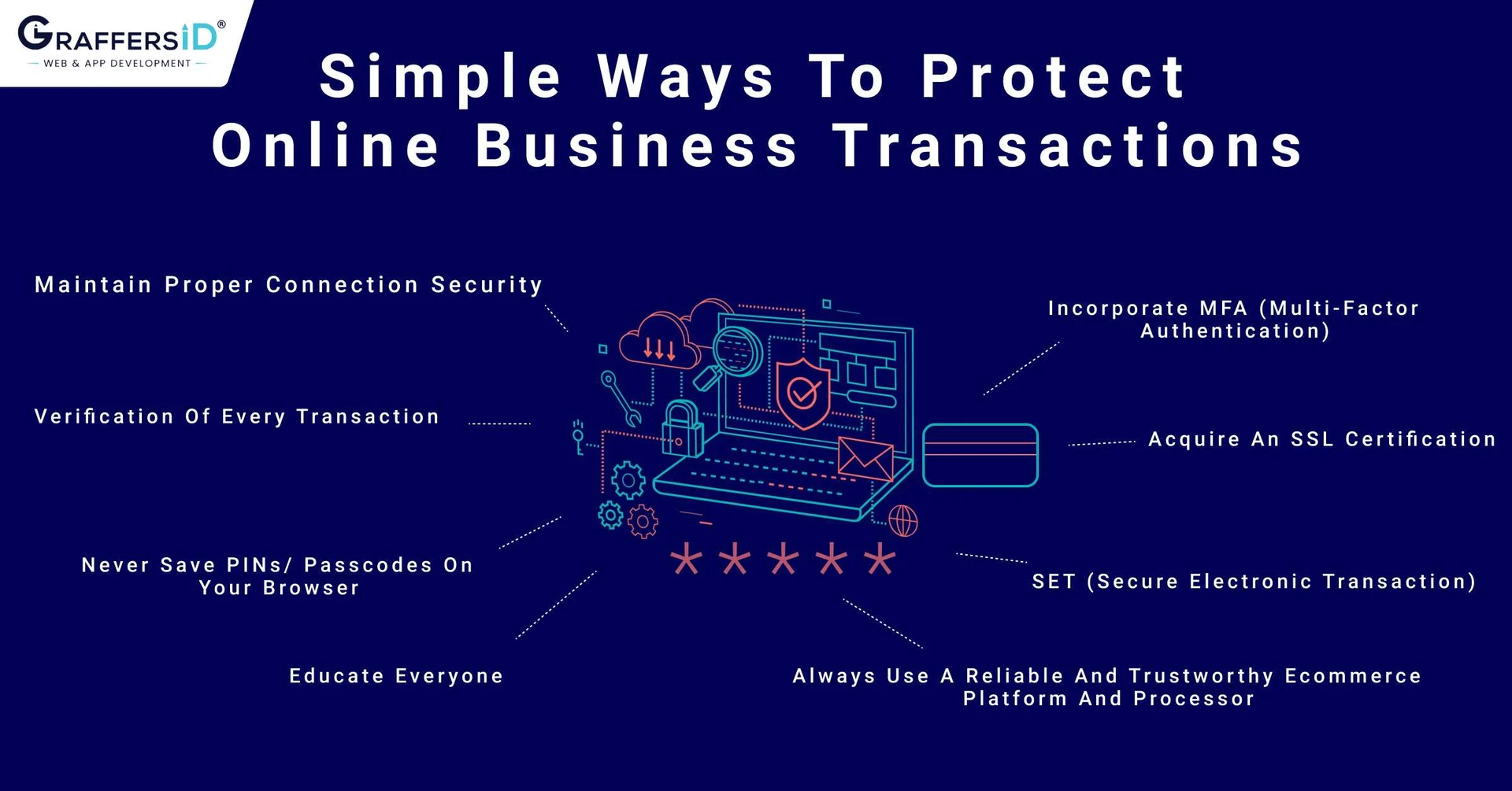Online transactions revved up after the Coronavirus pandemic. As per Statista’s Digital Payment Report, the online transaction value will be over $2,098,515 million by 2025. But, this has created equal opportunities for cyber threats. Hence, businesses should enforce proper safety steps to protect online transactions thereby, maintaining pace with the changing technologies.
If you are wondering what these precautions are, then here is a guide to help you out. Check out some of the ways to protect online transactions forever, without compromising anywhere:
1. Maintain proper connection security
Do not enter debit/credit card details when accessing through public Wi-Fi. There is a risk of free Wi-Fi being intercepted.
Cybercriminals can get between the user and the Wi-Fi connectivity and witness the transaction and influence it. Indiscreet internet connectivity can cause bank fraud.
Hence, make sure to check the legitimacy of the connection before doing any transaction.
As a shopper, it is suggested to prohibit using cybercafés to make transactions. As multiple users access one computer, you never have an idea which one has malware.
Want to know What it a WordPress Website? Advantages and Disadvantages of WordPress Website
2. Never save PINs/ passcodes on your browser
Surely saving passwords is convenient when people don’t want to sign in to their ID whenever they access the browser. It is not safe to leave your desktop or mobile signed in.
Saving your account’s password to the web browser is like putting your protector down ahead of your enemies.
And, if you still do it anyway, then choose a password manager. It generates a new password every time you sign in, eradicating the threat of password burglary.
3. Acquire an SSL certification
As a website owner, you don’t want any cybercriminal to sneak into your site. Hence, seeking the safety of a Secure Socket Layer certificate would be helpful to you.
The safety decorum encrypts the information being transmitted from one site to somewhere else and sends it through a safe network to safeguard it from getting intercepted by a hacker.
The SSL allows PCI/DSS compliance which is compulsory for online payment acceptance. Google supports SSL certificates and marks them as a major part of its ranking process. Thus, websites with SSL certification are ranked more than the ones that don’t have it.
SSL is available in three forms: a normal single-domain SSL as well as a multi-domain SSL, and a wildcard SSL. A normal SSL safeguards a solo domain at one time. It can be purchased at different authentication stages- DV, OV, or EV.
Know About How to Hire Offshore Developers for your Startup
Websites with EV SSL certificates are those which are completely vetted by a reliable Certificate Authority. It means, once domain ownership is recognized, your business status, legal identity, and addresses are certified.
Then, rather than a plain locked padlock, an EV certificate site has the name in green text or on a green bar along with the name and location of the company that acquired the certificate, making it tougher for any cybercriminal to hack a website for a phishing attack.
EV SSL certificates are highly recommended for big eCommerce websites and businesses. They add to the credibility by showcasing to the consumers that the website is serious about safeguarding the information of its customers. You can choose reliable and reputable EV SSL certificate providers to secure your websites.
On the other hand, businesses with multiple domains need a multi-domain Secure Socket Layer. The certificate safeguards around 250 FQDNs, and the number differs from one provider to another.
Lastly, a Wildcard Secure Socket Layer can protect a solo domain with an innumerable number of sub-domains. If you own an eCommerce store and want to enlarge it, go for wildcard certification.
Investing in a suitable SSL to handle your specific business requirements is an essential factor. You should know that startups can be shredded for money, and hence they prefer cheaper certificates.
Therefore, you should consider going for the cheapest SSL certificate as it provides similar encryption power as its costlier counterparts.
4. Incorporate MFA (multi-factor authentication)
Demanding shoppers to verify their identity two times may take a bit longer, but it is the need of the hour! Multi-factor authentication involves proving identity through OTP, fingerprint, or a PIN and an email ID and password to enhance payment security.
For instance, even if a cybercriminal hacks the passcode, they can never enter the OTP or change their fingerprint.
Integrating the same for your banking transactions will lead to strong payment security.
Know About How to Find a Developer For Your Startup?
5. SET (Secure Electronic Transaction)
SET is the collaborated effort of VISA and MasterCard to ensure the safety of all their consumers in e-payment transactions. It helps to manage important functions like:
- Validating cardholders and vendors
- Discretion of data and payment information
- Define processes and electric safety service providers
6. Always use a reliable and trustworthy eCommerce platform and processor
Not everyone can handle all the security measures. Hence, it is suggested to look for a reputable e-commerce website and payment processor. It gives you the comfort that a third party will offer additional security and help you identify threats.
Research the most reliable websites and payment processors and then shop around. Some reliable eCommerce platforms that offer high-quality payment security are Magento, Shopify, BigCommerce, and more.
7. Verification of every transaction
Apart from using an AVS to authenticate a transaction, other methods also safeguard a customer’s fiscal data and prevent fraudulency. One way is to ask customers to enter their CVV number mentioned on the card.
The transactions can also be verified without a customer’s card information. For instance, one can be vigilant about irrational and unusual patterns such as suspicious bulk orders from a low-earning customer. If a transaction like this is noticed, banks instantly notify the customer.
8. Educate everyone
Right from the website owners, staff to customers, everyone should be educated about safeguarding their personal and financial information. .
Make sure everyone stays updated with the online security approaches and recent data breaches. Sharing data with customers and the staff will help them recognize any unusual online activity and tackle the issue instantly.
Conclusion
Online transactions are going to last forever. People almost have become used to online shopping, even to shop their daily necessities. While this contactless transaction eases your life in many ways, it does leave you with the risk of cyber theft.
So, never do a transaction through an unsafe medium. Payment security is important for both the owner and the customer. Take every necessary precaution when doing online transactions to protect your personal information against all threats. Incorporate the above points in daily life and safeguard yourself against cybercrimes.




